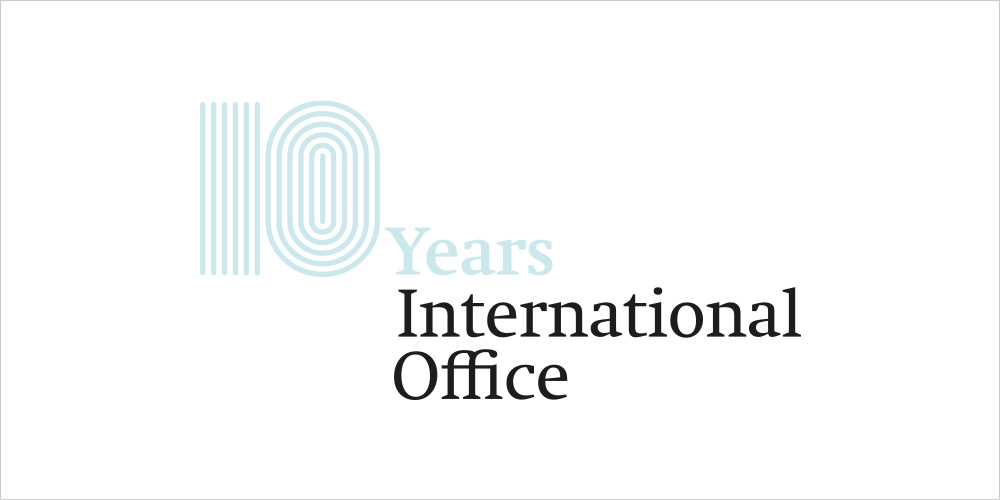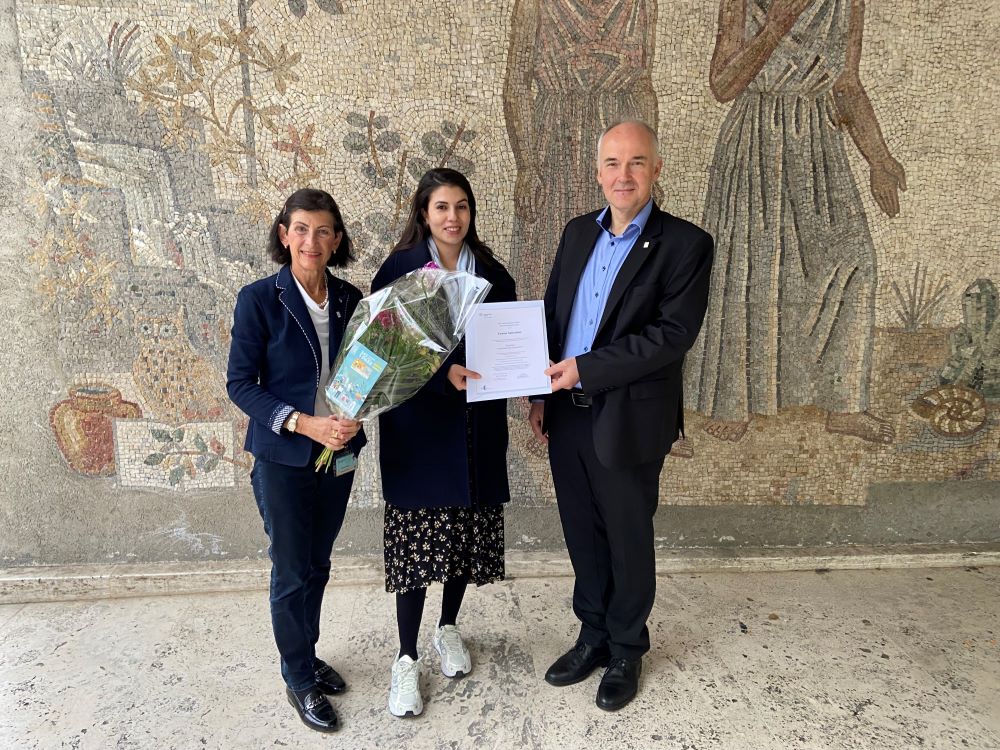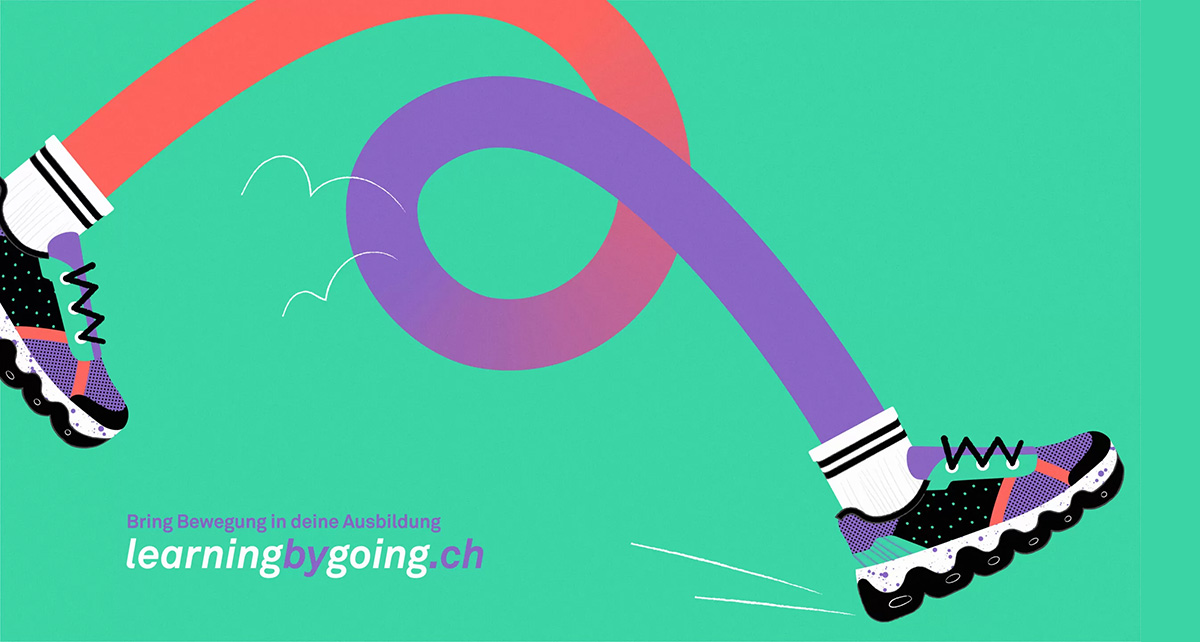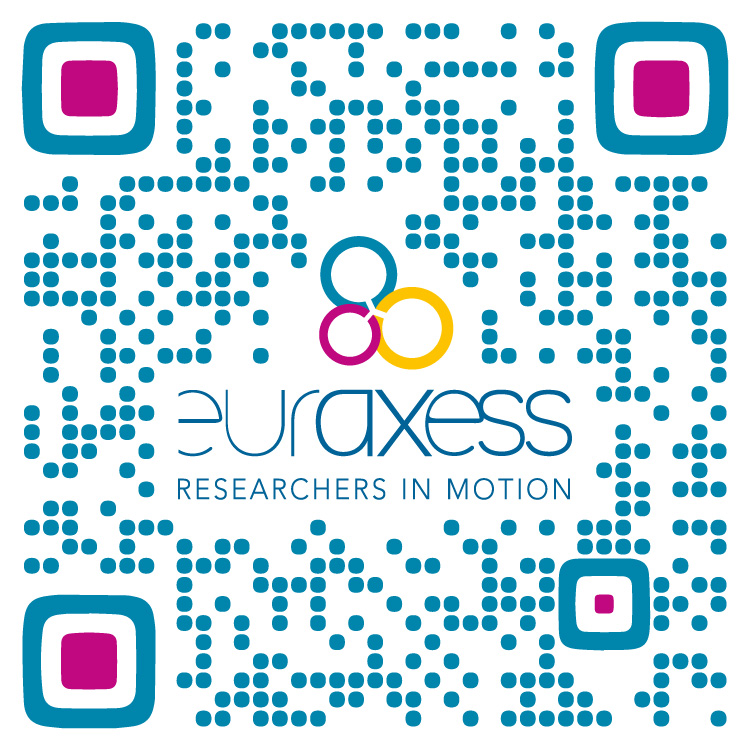10 Years Anniversary

The International Office celebrated its 10th year anniversary in 2024/2025, looking back on milestones and achievements as well as providing information about what is to come.
The International Office is made up of the three sub-units Student Exchange + International Relations + Welcome & Euraxess Centre (some of which already existed before the International Office was founded). It covers a wide range of topics, and works with broad target groups, from students and researchers to delegations and guests, as well as with external partners in the UK and abroad.
A celebration in the university auditorium rounded off our little anniversary end of 2025: With an impressive speech by former Swiss ambassador Dr. iur. Paul R. Seger on the current geopolitical world situation, musical interludes by our ESKAS scholarship holder (jazz music) & multi-instrumentalist Jonathan Collin, ‘international voices’ in the form of video messages from our students, researchers & partners, and a special international apéro.
Negotiations & Application: Hope for re-association with Erasmus+ & Horizon Europe (since 3/2024 respectively 4/2025)
As the International Office, we are currently working intensively on completing the application for the University of Basel to rejoin the pan-European Erasmus+ programme. In addition to Swiss institutions, universities in the United Kingdom will also submit their applications in mid-March 2026.
Successful reassociation with Erasmus+ would give the University of Basel full access to European Union funding and mobility programmes again from 2027. This would strengthen international cooperation, facilitate student and staff exchanges, and open up new opportunities for joint research and education projects.
Reintegration is an important step towards the further internationalisation of the University and underlines its commitment to an open, networked and future-oriented educational landscape in Europe Movetia | Erasmus+ in Switzerland: The most important facts at a glance
In 2025, the Federal Council approved the draft EU agreement on association with EU education and research programmes (Horizon Europe, Erasmus+, etc.), and Parliament ratified the overall package and secured the funding message. The way for this was paved by intensive negotiations between Switzerland and the EU on association with EU education and research programmes (Horizon Europe, Erasmus+, etc.) since March 2024.
Achievements & Outlook: Switzerland-Africa Programme (2007 - 12/2024) & SARECO Database (also in the future)
Our Swiss-Africa Programme (or AIT Swiss-Africa, as we now call it) began as a bilateral cooperation between Switzerland & South Africa in 2007, funded by the State Secretariat for Education, Research and Innovation (SERI). Anchored in Switzerland's bottom-up academic culture, the first final evaluation meeting of the programme in November 2011 in Pretoria/South Africa brought forth the desire of the academics participating in this programme for a strong matching tool. The SARECO database was created as a result and today serves not only as a matching tool, but also as a reference for all relevant stakeholders in Switzerland and in the programme's target countries for cooperation in the areas of research and innovation in the context of the Global North and South.
The database was developed aby International Relations, with the aim to provide interested parties with information about project collaboration with African and other non-European partners beyond the end of the programme. Fun (or worrying) fact: every month the database administrator has to deal with hundreds of hacking attempts.
Insight: About internationality | Head of the International Office in an interview with AlumniBasel (5/2024)
AlumniBasel's 2023 annual report has invited two alumni for an interview on this year's chosen theme of "Internationality". Among other things, the interview provides an insight into the challenges, faced by universities and International Offices today.
Award: 1st Certificate of Intercultural Competence | Intercultural Offers of the International Office (10/2023)
Cansu Sahinbay, employee in decentralised HR and Finance (Department of Biomedicine and Department of Classical Studies), was the first participant to successfully complete the Certificate of Intercultural Competence. The trilingual certificate including the EUCOR logo, certifies that she has attended at least 70 hours of courses in the areas of intercultural training, international mobility, foreign language skills and work performance with an intercultural focus. In the case of our employee, this included attending the course "Dealing with Conflicts" (as offered by Leadership & Development) and "English for Work B2/C1" (offered by the Language Centre). A particular highlight was the Staff Exchange week at Freie Universität in Berlin in 6/2023, funded by the Swiss-European Mobility Programme (SEMP). The certificate is an initiative of Student Exchange and the Welcome & Euraxess Centre. This offer is the third and largest intercultural offer of the International Office, which is a further component of "internationalisation at home".
Testimonial: Prof. Dr Susanne Bickel, Egyptology | about Student Exchange (3/2023)
"My international doctoral students always receive valuable information and advice from Student Exchange. In addition, around 50 doctoral students and post-docs from all over the world are able to continue their research at our university thanks to a Swiss Government Excellence Scholarship (ESKAS). They are supported by the competent and friendly team in the often complicated day-to-day and administrative issues. This support makes a big difference."
Prof. Dr Susanne Bickel, Egyptology, Department of Classical Studies, and delegate of the University of Basel to the Federal Excellence Scholarship Commission for Foreign Researchers and Artists (2011 - 2019). These government scholarships promote international exchange and research cooperation between Switzerland and over 180 countries. They are selected and awarded by the Federal Commission for Scholarships for Foreign Students (ESKAS). Within the International Office it is Student Exchange being primarily responsible for ESKAS scholarship holders and mobility.
Commitment: Refugee researchers & students from Ukraine | International Office in continuous operation (3/2022 - 2/2023)
After the start of the Russian war of aggression against Ukraine, researchers and students who had fled also reached the University of Basel in March 2022. Together with colleagues in faculties, departments and units and many supporters from AlumniBasel and the general public, the International Office worked hard to help in a variety of ways: under the leadership of the International Office, a total of 11 "Scholars at Risk" were able to find temporary employment at the University of Basel thanks to funding from the Swiss National Science Foundation (SNSF). Many other researchers and students who had fled found temporary accommodation for research and studies or have since been able to continue their education or careers. The Welcome & Euraxess Centre - like all Welcome & Euraxess Centres throughout Europe and overseas - was in continuous operation for months, offering support with first steps in Switzerland, integration, finding accommodation and answers on many new questions in the context of war and escape. Further support and information is provided by University of Basel, ERA4Ukraine and Swissuniversities.
Support: Workshop on intercultural skills for exchange students| Internationalization at home (since 10/2022)
In order to support and allow international incoming students to make the most of their stay at our University and in Switzerland, we developped a workshop which combines intercultural with practical knowledge, embedded in the specifics of our university and the Basel area, topped-up by an enterraining and fun format. Every year in autumn new international incoming students share their first experiences and boost their intercultural tools. For hosting universities such offers are of great benefit, too, as they contribute to the "internationalization at home", strengthening the capacities and skills of everyone: Incoming students, local & potential outgoing students as well as staff.
Digitalisation II - Erasmus Without Paper (EWP) (Kick-off 2020/2021)
By participating in the 2021-2028 generation of the Erasmus programme, all European universities have committed to fully implementing the digitalisation of central mobility programme processes in the future as part of "Erasmus Without Paper" (EWP). As the previous database solution MoveON is a browser-based mobility software, Student Exchange can participate directly in this development. We have been implementing EWP step by step since 2020: extending bilateral agreements, registering, selecting students and allocating exchange places, nominating exchange students, awarding scholarships and managing learning agreements. The technical demands and coordination requirements for International Offices are increasing everywhere in Europe, and many International Offices are differentiating themselves in terms of task profiles and personnel resources. Departmental mobility coordinators at the University of Basel now also have access to MoveON and can take steps relevant to their department directly. The programme is now also used by the Welcome & Euraxess Center and for the Certificate of Intercultural Competence.
UNESCO Chair: With support of International Relations (since 2019)
The award of the UNESCO Chair for "Physical Activity and Health in Educational Settings" at the Department of Sport, Physical Activity and Health (DSBG) in 2019 meant the first and so far only UNESCO Chair for the University of Basel. It is a research and teaching unit supported and funded by the DSBG of the University of Basel and the Nelson Mandela University (NMU) in South Africa. An agreement was concluded between the University of Basel and UNESCO to develop and provide online learning programmes (SLPs) for teachers and schoolchildren in South Africa and worldwide. The project was a success and the agreement was extended for another four years in 2023. International Relations helped to prepare the agreement and, together with the University of Basel's Legal Services, supported the drafting of the dissemination agreements for the toolkit. The dissemination of these tools has recently started in Ethiopia and Nigeria.
Together: Café international | Internationalization at home (since 03/2018)
Universities and societies around the world are becoming increasingly international - this is already the case for universities, even more for the University of Basel, which is a research-intensive university located in a tri-country region. In order to make this enriching diversity visible and promote interaction between locals and newcomers, the University's Language Center and International Office have been offering Café international events since spring 2018: Intercultural sensitisation in an entertaining way in various formats - from panel discussions and city tours to an exchange of experiences. The Café International offer also includes the visualisation of other intercultural offers/components at the University of Basel. Such type of offers are part of the so-called "internationalization at home", i.e. internationalization does not only happen abroad, but also within the country and home-university.
Good advice from Student Exchange: Going abroad - What you should consider
Beast Blog Interview 3/2017 with the Student Exchange Team, which advises students and coordinates study visits abroad:
Upgrade: Welcome Center becomes also Euraxess Center (2/2016)
Around two years after its launch, the Welcome Center became the Welcome & Euraxess Center at the University of Basel in 2016 and thus part of the global Euraxess network for mobile academics. This offers counselling and support in 40 European countries and at 9 hubs overseas (Japan, India, China, Singapore, South Korea, Australia & New Zealand, North and South America and Africa). Although this step does not involve any additional funding for the work, it does mean greater visibility and, above all, continuous professionalisation through the exchange of information and experience, training and quality development within the international network. This Euraxess Switzerland clip informs about the most important service offers and first steps in Switzerland.
Special: The Welcome & Euraxess Center at the University of Basel is one of the few centers in the world that offers advice and support for three countries at once CH/F/D (Regio Basel).
Digitalisation I - Start and introduction: New mobility with MoveON (2014/2015)
The University of Basel has over 400 agreements in more than 40 countries with over 200 universities (11 in Switzerland, 168 in Europe, 39 worldwide), about which our MoveON database provides information. What appears on the website as a database is actually a comprehensive administrative programme for the international sector. The digitalisation process was launched at the same time as the newly created International Office in late 2014. What was previously entered by hand as an overview of exchange destinations and listed on the website was now entered into the administration programme. One of the new advantages was that students and departments could now search for possible programmes and exchange destinations using various selection criteria. In a next step, the registration process for students in all areas was also switched to online registration in 2015 (SEMP Swiss European Programme, for mobility within Switzerland, for the network programmes with the USA, Australia and Brazil as well as direct bilateral agreements of the University of Basel).
Dual Career Advice: Professional & social integration² (2014/15)
Increasingly, universities are also responsible for supporting the social and professional integration of newly appointed professors' accompanying partners. After the Equal Opportunities Unit had done the groundwork in this area, the Dual Career Advice became the responsibility of the International Office soon after its launch. Originally established in many countries to remove the structural obstacles for women on the path to a professorship ("leaky pipeline"), dual career counselling has since become a necessity for newcomers and returnees from abroad in the competition between universities for the best minds. As a result, the University of Basel was - via the International Office - in 2018 a founding member of the Swiss Academic Dual Career Network (S-ADCN), which promotes dual career topics and cooperation throughout Switzerland.
Twice as new: "Welcome" at the International Office (10/2014)
This was the Uni News headline in autumn term 2014 when the International Office was founded by merging two units that had previously been embedded in a different organisational structure. Student Exchange (formerly called "Mobility" and in existence since 1995) and International Relations ("Global Affairs" since 2007) came together, supplemented by the new sub-unit "Welcome Centre". This development took place in the same or a similar way at many universities worldwide as part of the increasing internationalisation and professionalisation of universities and increased mobility in general; quite a few now even have their own "Vice-Rectorate for International Affairs".
Vote with consequences: Switzerland is downgraded to a third country in the understanding of higher education | New SEMP instead of Erasmus+ (2014/2015)
A major turning point: Following the Swiss vote on the federal popular initiative "Against Mass Immigration" on 9 February 2014, the EU suspended negotiations on Switzerland's participation in the EU Erasmus+ programme and returned Switzerland to the status of a third country on 26 February 2014. Thanks to the transitional solution worked out by the federal government from 2014/15, student exchanges could be continued. For students at Swiss universities, this means that they can participate indirectly in the programme, provided the respective partner university agrees to the exchange. The Swiss counterpart to Erasmus+ has since been called the Swiss European Mobility Programme - SEMP. For Student Exchange, this means an increased coordination, explanation and administrative effort with regard to the existing, albeit modified, mobility modalities for incoming and outgoing students.
Review: Academic-Industry Training (AIT) Switzerland - South Africa (7/2007 - 12/2024)
When the State Secretary for Education, Research and Innovation (SERI), Charles Kleiber, and the South African Minister of Education, Mangena, signed the Memorandum of Understanding (MOU) for Cooperation in Science & Innovation in December 2007, they laid the foundation for the bilateral funding of hundreds of joint research projects and mobility activities and the participation of over 250 companies in the joint programme, which has been managed by the South African Technology Innovation Agency (TIA) and the International Office of the University of Basel since then and will run until the end of 2024. These recordings of the Johannesburg Conference 2023 and Lagos Conference 2/2024 give an impression of the range of topics.
Proven: Utrecht Network - a European network with a global perspective (since 1995)
The University of Basel has been a member of the Utrecht Network (UN), which is made up of 30 universities from all over Europe, for around three decades. With a focus on mobility, the network aims to share best practice, improve the internationalisation process and, in particular, mobility for students and staff. The UN also has well established links with partner networks in the USA (MAUI Network) and Australia (AEN) and a newly established link with the Brazilian REARI-RJ Network, proving that it is indeed a European Network with a global outlook.The network also promotes summer schools, internationalisation of curricula, joint curricula and double/joint degrees. This Utrecht Network Youbtube clip illustrates this. The Student Exchange team is responsible for the Utrecht Network.





